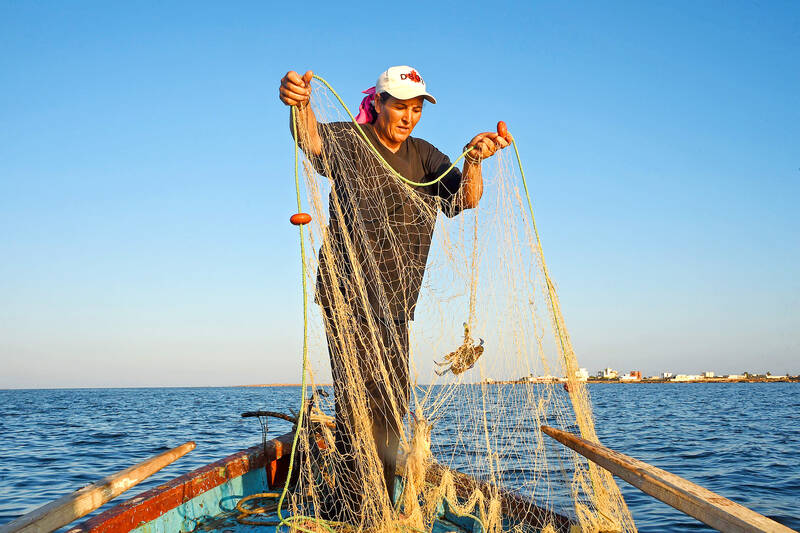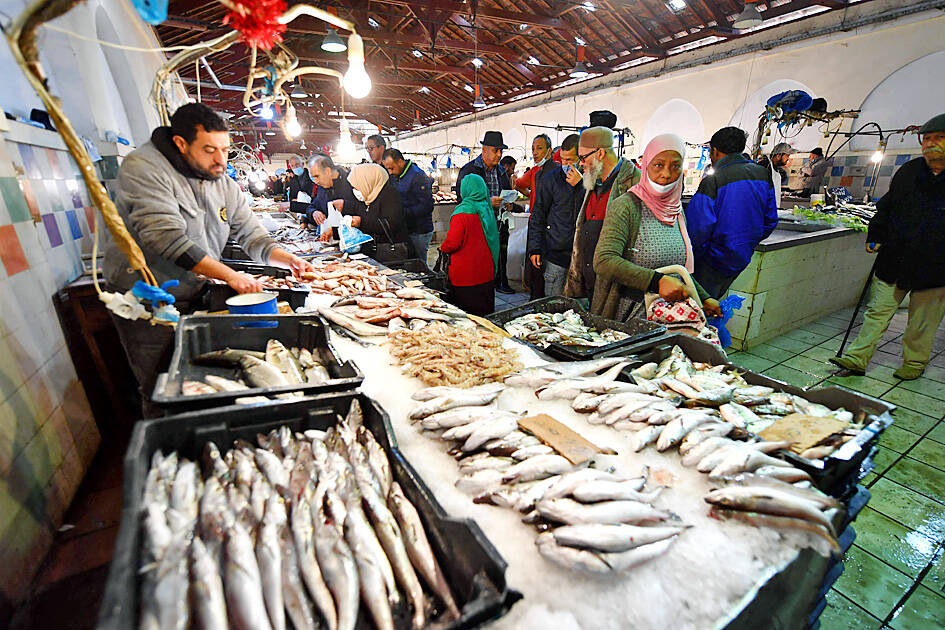Off a quiet Tunisian island, Sara Souissi readies her small fishing boat. As a woman in the male-dominated trade, she rows against entrenched patriarchy, but also environmental threats to her livelihood.
Souissi began fishing as a teenager in a family of fishers off their native Kerkennah Islands near the city of Sfax, defying men who believed she had no place at sea.
“Our society didn’t accept that a woman would fish,” she said, hauling a catch onto her turquoise boat.

Photo: AFP
“But I persisted, because I love fishing and I love the sea,” said Souissi, 43, who is married to a fisherman and is a mother of one.
A substantial portion of Tunisia is coastal or near the coast, making the sea an essential component of everyday life.
Seafood, a staple in Tunisian cuisine, is also a major export commodity for the North African country, with Italy, Spain and Malta the top buyers, and revenue nearing 900 million dinars (US$296.1 million) last year, official figures showed.

Photo: AFP
Tunisian women have long played a major role in this vital sector, but their work has been undervalued and unsupported, a recent Food and Agriculture Organization study found.
The study said that while women were actively involved throughout the fishing value chain, they remained “generally not considered as an actual worker” by their male counterparts.
Fisherwomen also have less access to administrative benefits, training and banking services, where they are viewed as “high-risk borrowers” compared with men, the study said.
As a result, many do not own their own boats, and those working with male relatives are “considered as family help and therefore not remunerated,” it added.
In Raoued, a coastal town on the edge of the capital, Tunis, the Tunisian Society for Sustainable Fishing launched a workshop in June for women’s integration into the trade.
However, most of the women attending the training said that they were only there to help male relatives.
“I want to help develop this field. Women can make fish nets,” participant Safa Ben Khalifa said.
There are no official numbers for fisherwomen in Tunisia.
Although Souissi is formally registered in her trade, many Tunisian women can work only under the table — the World Economic Forum said that 60 percent of workers in informal sectors are women.
“We want to create additional resources amid climate change, a decrease in marine resources and poor fishing practices,” said Ryma Moussaoui, the Raoued workshop coordinator.
Last month, the Mediterranean Sea reached its highest temperature on record at a daily median of 28.9°C, the Spanish Institute of Oceanography said.
Pollution and overfishing have compounded the strain on sea life and resources in countries such as Tunisia.
Rising temperatures make the waters uninhabitable for various species, while unsustainable fishing such as trawling or using plastic traps indiscriminately sweeps up dwindling sea life and exacerbates pollution.
“They don’t respect the rules,” Souissi said about fishers using those methods. “They catch anything they can, even off-season.”
In 2017 in Skhira, a port town on the Gulf of Gabes, 40 female clam collectors formed an association to enhance their income — only to see their hard-won gains later erased by pollution.
Before its formation, the women earned about one-10th of the clams’ final selling price in Europe, association president Houda Mansour said.
By cutting out “exploitative middlemen,” the association helped boost their earnings, she added.
However, in 2020, the government issued a ban on clam collecting due to a severe drop in shellfish populations, leaving the women unemployed.
“They don’t have diplomas and can’t do other jobs,” said Mansour, now a baker.
In hotter, polluted waters, clams struggle to build strong shells and survive. Industrial waste discharged into the Gulf of Gabes for decades has contributed to the problem.
It has also forced other species out, said Emna Benkahla, a fishing economics researcher at the University of Tunis El Manar.
“The water became an unfavorable environment for them to live and reproduce,” undermining fishers’ revenue, she said.
“Because they couldn’t fish anymore, some sold their boats to migrants looking to cross the Mediterranean illegally,” she added, calling for more sustainable practices.
Souissi, who only uses relatively small nets with no motor on her boat, said she and others should fish responsibly to survive.
“Otherwise, what else can I do?” she said, rowing her boat back to shore. “Staying at home and cleaning? No, I want to keep fishing.”

Quanta Computer Inc (廣達) chairman Barry Lam (林百里) is expected to share his views about the artificial intelligence (AI) industry’s prospects during his speech at the company’s 37th anniversary ceremony, as AI servers have become a new growth engine for the equipment manufacturing service provider. Lam’s speech is much anticipated, as Quanta has risen as one of the world’s major AI server suppliers. The company reported a 30 percent year-on-year growth in consolidated revenue to NT$1.41 trillion (US$43.35 billion) last year, thanks to fast-growing demand for servers, especially those with AI capabilities. The company told investors in November last year that

Intel Corp has named Tasha Chuang (莊蓓瑜) to lead Intel Taiwan in a bid to reinforce relations between the company and its Taiwanese partners. The appointment of Chuang as general manager for Intel Taiwan takes effect on Thursday, the firm said in a statement yesterday. Chuang is to lead her team in Taiwan to pursue product development and sales growth in an effort to reinforce the company’s ties with its partners and clients, Intel said. Chuang was previously in charge of managing Intel’s ties with leading Taiwanese PC brand Asustek Computer Inc (華碩), which included helping Asustek strengthen its global businesses, the company

Taiwanese suppliers to Taiwan Semiconductor Manufacturing Co. (TSMC, 台積電) are expected to follow the contract chipmaker’s step to invest in the US, but their relocation may be seven to eight years away, Minister of Economic Affairs J.W. Kuo (郭智輝) said yesterday. When asked by opposition Chinese Nationalist Party (KMT) Legislator Niu Hsu-ting (牛煦庭) in the legislature about growing concerns that TSMC’s huge investments in the US will prompt its suppliers to follow suit, Kuo said based on the chipmaker’s current limited production volume, it is unlikely to lead its supply chain to go there for now. “Unless TSMC completes its planned six

Power supply and electronic components maker Delta Electronics Inc (台達電) yesterday said it plans to ship its new 1 megawatt charging systems for electric trucks and buses in the first half of next year at the earliest. The new charging piles, which deliver up to 1 megawatt of charging power, are designed for heavy-duty electric vehicles, and support a maximum current of 1,500 amperes and output of 1,250 volts, Delta said in a news release. “If everything goes smoothly, we could begin shipping those new charging systems as early as in the first half of next year,” a company official said. The new